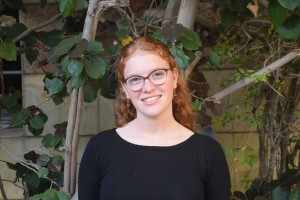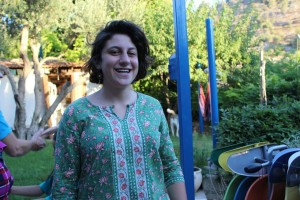From Refuser Solidarity Network
Two young women, Tamar Alon, age 18, and Tamar Ze’evi, age 19, will stand before a military tribunal and refuse to serve in the Israeli army. Refuser Solidarity Network is proud to support their campaign along with organizations from around the world. Alon’s photo was taken by Maya Rachlin and Ze’evi’s by Yarden Boytner.
If you are in Washington, D.C., please join us at the White House on Thursday December 1st, at 6:30pm.
Tamar Alon
 My name is Tamar Alon. I am 18 years old. On the 16th of November 2016, I intend to refuse to enlist in the IDF, and probably will be imprisoned for my actions. My civil duties I wish to fulfill in the national service.
My name is Tamar Alon. I am 18 years old. On the 16th of November 2016, I intend to refuse to enlist in the IDF, and probably will be imprisoned for my actions. My civil duties I wish to fulfill in the national service.
I met my parents’ Palestinian friends from a young age. I met people who were supposed to be my enemies, but they smiled at me, played with me, and talked to me. These early experiences have taught me to look at the daily reality of the Palestinians and the reality of my own life in a critical manner. I cannot accept the claim that the oppression of another nation, the denial of basic human rights, racism and hatred are essential to Israel’s existence.
I do not delude myself that this reality is one-dimensional, or that the solution is easy and immediate. Though, I do believe that the ways of war, violence, oppression and domination will not allow us over time to maintain a democratic country and to be “a free nation in its country”. I refuse to enlist in the IDF out of concern and love for the society that I belong to, and I aspire to encourage a public discussion about its image and future.
My decision not to enlist is the result of a long and complex process, but the defining moment in which I realized that I must refuse to join the circle of victims here and there, occurred during the last memorial day when I attended the tenth Israeli-Palestinian memorial ceremony. The last two speakers in the ceremony were two bereaved siblings: Yigal Elchanan, who lost his sister Smadar, 14 years old, in a Jerusalem bombing in 1998; and Arab Aramin, who lost his sister Abir, 10 years old, who was killed by gunfire from IDF border troops near her school in Anata in 2007. Both Yigal and Arab described the killers of their sisters as victims as well. This opened my eyes to the fact that in the reality of occupation and oppression, even the ruler and ruled, oppressor and the oppressed, too – everyone is a product of this method and system which generates and duplicates hatred and death. The spirit of all is wounded. The grief and pain are the same on both sides. The two bereaved brothers had reinforced my understanding that there is a different path, and that it is my responsibility to choose that path. I consciousnessly choose to refuse, knowing that not every young woman can choose like me.
I know that in military prison I might meet young women who did not have the privilege to choose to refuse. I am not blind to the circles of oppression that exists in the Israeli society against women, Mizrahi Jews, immigrants and other marginalized populations. I am not blind that these circles of oppression are reflected – and reinforced – in the army as well. On the contrary, by refusing to give a hand to the oppressive system, I ask to be in solidarity with those who are deprived of the freedom to choose.
Tamar Ze’evi
 Hi, my name is Tamar Zeevi. I’m 19 years old and I’m from Jerusalem. I like traveling in Israel and in the world and I’m interested in sustainability and education. On November 16th, 2016, my supposed recruitment date, I will refuse to join the IDF, and will choose to pay the price that the army demands that I would pay for my conscience. The choice not to enlist means to take responsibility for my actions and their meaning, and drawing a moral line that I’m not willing to cross. It means actively resisting a government and a policy that violates human rights and fueling a violent and cruel reality.
Hi, my name is Tamar Zeevi. I’m 19 years old and I’m from Jerusalem. I like traveling in Israel and in the world and I’m interested in sustainability and education. On November 16th, 2016, my supposed recruitment date, I will refuse to join the IDF, and will choose to pay the price that the army demands that I would pay for my conscience. The choice not to enlist means to take responsibility for my actions and their meaning, and drawing a moral line that I’m not willing to cross. It means actively resisting a government and a policy that violates human rights and fueling a violent and cruel reality.
My process of dealing with recruitment to the army began few years back. I began to explore questions about the meaning of serving in the IDF, the duty and the responsibility I bear as an Israeli, and misgivings about the IDF’s policies in the occupied territories and the occupation as a whole. I thought a lot about the topic, often talked and consulted friends, teachers and family, and fluctuated a lot between the different arguments, stories and expectations.
During the last two years of high school I studied abroad in an international school in India (UWCMC), together with friends from around the world, and it was a challenging, enriching and amazing experience. There is no doubt that distance from Israel has played a meaningful role in the process of questioning the policies in Israel, and mainly taught me that military enrollment is a choice and not necessarily the obvious route. People around me demanded me to critically investigate the reality in my homeland, and in classes I was exposed to texts that planted in me an understanding of my responsibility for this reality, and my power to change it.
On one hand, it is my legal and social duty. I was always expected to perform this role, and told it is my right to take part in securing my home and the people who are dear to me. But on the other hand, are a childhood and a life in the shadow of terrorist attacks and wars real security? What about the safety of people beyond the walls? Am I as a part of the nation that controls their lives also responsible for their safety? Where is the line at which one should stop cooperating, and have we already crossed it? These questions stirred in me in a hard and difficult way. Sometimes I reacted with defensiveness, and sometimes in a powerless and frustrated way.
All of this was not enough to convince me to deviate from the expected and the normative route, and the choice to serve in the military was my default. I returned to Israel and started a service year in Sayarut (Green Horizons), the youth movement I was a member of since 6th grade. My years in Sayarut, during which I had explored the landscapes of Israel, tasted its soil and breathed its views, were those that planted in me the feeling that I am the daughter of this land, belong to it and love it. Acclimatizing back in Israel wasn’t easy, and this time, living in this state with more critical eyes, and both international and local points of view, brought back the question of enlistment in a more present and real way.
I came to realize that recruitment is my first and real confrontation with the occupation and the conflict. This is the place and this is the point in which I choose. Am I willing to take responsibility for the oppression and discrimination that lives on our land? Am I going to take part in the scary system that differentiates between humans, prefers some over others, and feeds the circle of violence, hate and fear? Thus, in one defining moment, I understood that I won’t. I am not willing to support a situation in which two nations live in fear of each other, and pay such a heavy price for decades. Out of love to the land and to the people who live on it, I want to believe, and do believe that there is a different way, and that change is possible.
Fear is the hardest disease that exists in this country. It is horribly contagious, passed from generation to generation, and mainly breeds ugly side effects such as alienation, hatred and violence. Fear’s favorite food is uncertainty, and in the lives of Palestinians in the West Bank and Gaza Strip, Israel and the IDF make sure that nothing in life is to be taken for granted. Getting up in the morning with fear and going to sleep with it is not a way of life that I am ready to take part in conserving, particularly when the meaning of it is increasing and enlarging the problem itself.
We will get out of the cycle of fear and violence only when we’ll open our hearts and minds, look at what is happening around us, beyond the physical and social walls and let ourselves feel the reality and pain of all the people for whom this country is their home. Once we all will agree to understand and accept that this is reality, I want to believe that the way of empathy, tolerance and compromise will be our only choice.
I know it is a complicated matter. Hatred and violence on both sides exist and are dangerous, and we shouldn’t be naive when examining this reality. Nevertheless, we must not stop hoping that it could be better here. We must not accept the acts being done in our name behind the wall of hiding and separation. And this is my responsibility and yours. There is no one way to make change, to be honest, there are infinite possibilities, and everyone will chose what they can do for our world.
The choice to refuse serving in the Israel Defense Forces is one of the milestones in my path to make life in this homeland a life of peace, freedom and fraternity.
